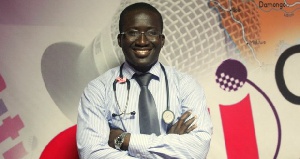October was breast cancer awareness month, marked the world over to draw the attention of the public to this curable malady. After years of preaching this gospel in Ghana, through NGOs, the media, and outreach services, women still come to the hospital in the late stages of the disease. By which time the disease would have spread to all the major organs and patient is emaciated, listless and hanging on their last breath. And a very common reason for this is “We were at a prayer camp.”
Breast cancer is only one of the many illnesses rushed to the emergency room of the spiritual healer. Mental illness is even more identifiable with this environment; these poor souls are sometimes not only chained and left in the sun to bake, but also the devil is, literally, beaten out of them.
When it is found that the evil spirit is too “stubborn” for the church, they are sent packing to the faithless doctor to apply his magic potion. In many such instances, the only thing we can do is to perform the last rites pray for the lord to keep their soul. Ironically, if they are cured, they go back to give a thanks-offering to this same man of God.
Are our health facilities so bad that our first point of call in any “serious” illness is the prayer camp? I don’t think so. Are there so few medical professionals that we don’t find any when we look for them? I don’t think so. Are there so few hospitals that we cannot access quality health care timeously? May be.
However, the incantations of a religious jack-of-all-trades are definitely not the solution. Needless deaths and disabilities occur from delayed attendance to health facilities. Ours is a highly religious, and sometimes overly superstitious, society, but in this age of science and technology, it is unfortunate to prefer hope and prayer over a structured attempt at healing.
A recent study by Annan and colleagues published in the Journal of Science and Technology, on the health seeking behavior among tuberculosis (TB) patients in the central region, found that first point of treatment for more than half of the respondents was outside the TB treatment center. Imagine the number of people who were put at risk by these TB patients when they went seeking medical help from prayer camps. In that study, it was also found that health insurance played an important role in the health seeking behaviour of respondents.
45.9 percent of TB patients with health insurance visited the health facility as first provider whilst 49.4 percent without health insurance visited prayer camps. Additionally, the study revealed that factors such as staff attitude, distance to treatment centres, gender, employment and education affect health-seeking behavior.
With this health-seeking behavior, I shudder to think of the chaos that will come with diseases unfamiliar to us. Imagine what will happen if a highly contagious infection like Ebola finds its way to Ghana.
In some cases the patient’s first point of call is the hospital, only to bolt to the almighty healer when they hear words like surgery, chronic and cancer. The sad part is, the doctor cannot even begin to identify those who are flight risk.
The results from the study is largely generalizable, and helps us identify the reasons why this situation prevails. The government, the healthcare institutions and auxiliary actors, the medical professional and ultimately, the patient, have their parts to play to turn this situation around. People will get better if they seek healthcare early.
So we take today’s memory verse from Jeremiah 8:22- “Is there no balm in Gilead; is there no physician there? Why then is not the health of the daughter of my people recovered.” It’s about time we reversed the roles back to what they ought to be. I am a doctor, I deal with the physical; he is the priest, he deals with the spiritual.
Writer: Dr. Kojo Nimako
Email: kojotwumnimako@gmail.com
Twitter: @KTNimako
Health News of Thursday, 27 November 2014
Source: dr. kojo nimako

















